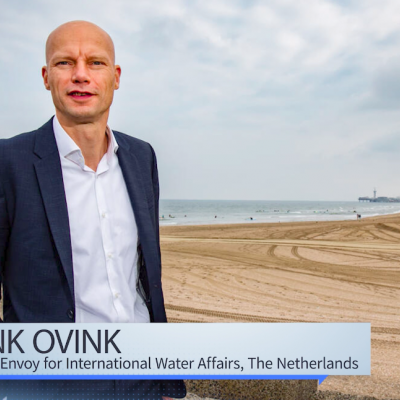Report And Video: Experts Engage On Water Solutions For Our Changing Climate
Nature-based Solutions, Unconventional Water Resources
2 Nov 2021 by The Water Diplomat
GLASGOW, United Kingdom
Video of the "Water Solutions For Our Changing Climate" event is HERE recorded Monday 1 November.
Water is the face of climate change and it is also the face of the potential solutions that we can develop to deal with climate issues both in the field of climate change mitigation and adaptation.
In the search for water solutions, on the 1st of November, the International Water Resources Association (IWRA) together with the University of Strathclyde, the University of Dundee and The water Diplomat hosted a pre-COP26 seminar on water solutions for climate change. The event served to bring together a broad spectrum of water related solutions to increase water security in a changing climate.
Solutions were presented both in the area of nature-based solutions and in the areas of new, emerging water technology. Prof. Christopher Spray from the University of Dundee University pointed out that future impacts of climate change can be modelled at a very localised scale, and currently, in the Borders of Scotland, monitoring of the impacts of nature-based solutions is underway. Science offers significant anchors for nature-based solutions, and interventions such as debris dams, tree planting and river re-meandering are useful tools to lessen the impact of greater river flow and variability. However, in introducing such changes, understanding community responses is key and solutions need to make economic sense to stakeholders if they are to be broadly accepted.
Lessons from Ethiopia and Pakistan, presented by Mihretab Gebratsadik, from the Tokyo National Graduate Institute for Policy Studies centred on the role of tree planting: Ethiopia has launched the planting of 6 billion trees as a climate adaptation measure and to replenish groundwater in the context of its “green legacy” campaign. Similarly Pakistan, which ranks fifth in the world in climate vulnerability, has launched a 10 billion tree planting ‘tsunami’ to reduce flood risk and respond to the dangers of glacier melt and snowfall reduction in the upper catchment. One of the key challenges of replanting is the tendency to plant large numbers of a single species, which does not restore biodiversity.
Reporting from New York, Thaddeus Pawlowski from Columbia University Centre for Resilient Cities and Landscapes described how 1.2 million people in New York City are located in areas that can be inundated, and power outages during the super storm Sandy in 2012, also show very clearly which areas were affected. The current vision is for more protection along the waterfront, (re)converting land into the underlying natural drainage areas, moving people further inland and developing multiple lines of defence. However, the climate for stakeholder involvement in the development of this vision and resolution of key conflicts is not yet present.
In the section on the impacts of new technology on development, Prof Cecilia Tortajada of Glasgow University provided an overview of technical innovation in Singapore’s water sector. Singapore relies for its water on the local catchment, imported water, the reuse of treated wastewater and on desalination. Singapore works with a 50-year planning framework which provides stability and enables long term investment in research and development amounting to $724 Million (Singapore dollars) since 2002. This resulted amongst other things in a smart water drainage grid, close monitoring of the quality of treated wastewater and a water solutions demonstration fund for promising initiatives.
On the topic of unconventional water resources, Dr Renee Martin Nagle from A Ripple Effect, listed techniques such as fog harvesting, vapour harvesting, cloud seeding, rainwater harvesting, onshore and offshore deep groundwater, reuse of municipal wastewater, desalinated brackish water, and more hypothetical techniques such as iceberg towing and ballast water.
Netra Chhetri from Arizona State University spoke of two classes of geoengineering, i.e. solar radiation management and carbon dioxide removal. The predominant research in these fields is very much driven by wealth, and in terms of equity and justice there is a fear of the unknown: it could offset some of the effects of GHGs on regional and global climate including the water cycle, but could also induce abrupt water cycle changes if rapidly implemented.
- Climate Change
- Innovation, Infrastructure & Technology
- Policy & Legislation
- Europe
- United Kingdom
- Glasgow
- International Water Resources Association
- University of Strathclyde
- University of Dundee
- Christopher Spray
- Mihretab Gebratsadik
- Thaddeus Pawlowsk
- Cecilia Tortajada
- Renee Martin-Nagle
- Netra Chhetri
- David Duncan
Related Topics
31 Oct 2021 GLASGOW, United Kingdom
High-level Forum, Glasgow, pre-COP26 (recorded footage is linked): On the eve of COP26, Ministers, heads of international organisations, leading figures from public and private sec...

29 Apr 2021 Edinburgh, United Kingdom
Henk Ovink, Special Envoy for International Water Affairs of the Netherlands talks to us about his work, the Netherlands' unique approach to valuing water and the need for global c...
